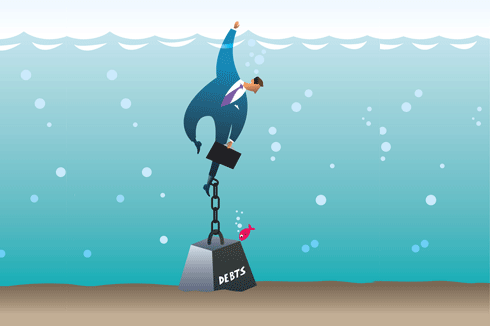 Debt management plans are usually offered as a part of a debt consolidation solution to your various debt problems. According to doylesalewski.ca it is a great way for you to seize control of your own finances and eliminate any unsecured debts you may have at the same time. Remember that unsecured debts are those that aren’t covered by a collateral asset such as a house or car. Typical unsecured debts include credit cards and student loan payments.
Debt management plans are usually offered as a part of a debt consolidation solution to your various debt problems. According to doylesalewski.ca it is a great way for you to seize control of your own finances and eliminate any unsecured debts you may have at the same time. Remember that unsecured debts are those that aren’t covered by a collateral asset such as a house or car. Typical unsecured debts include credit cards and student loan payments.
How it Works for You
When you sign up for a debt management plan, you are required to make a deposit every month to the company you signed up with. This deposit is used by the advisors at the company to pay off each of your multiple debts in a schedule that has been negotiated and agreed upon with the people you owe money to.
This monthly deposit you make is one that is determined by how much you can afford to pay each month while living frugally. You are informed of the amount you will pay before actually signing any agreements. You can have the monthly payment amount suggested to you by letting the debt management company analyze your income and expenses.
The Benefits of Using Debt Management Plans
These plans are made for a single reason – to keep your organized. This is the main advantage of such a program. It doesn’t reduce how much you owe, of course, but makes it far easier to pay off the debts because you make them on time. You can also finally make a budget for yourself that has a set goal and is realistic, without overdoing your spending on debt payments. These regular payments you make to pay off your debts also serve to improve the look of your credit score as time goes by, meaning that your creditors will no longer need to call you every two days to remind you about your outstanding payments.
Choose the Right Counseling Company
There are many credit counseling companies out there that are willing to help you manage your debt with a debt management plan. Most of these claim to be non-profit, while others will charge you for their services. You should always try to find a company that has trained, qualified and certified counselors working for them. Agencies like the Consumer Protection Agency, the Better Business Bureau, and the local DA office can help you identify companies that have a good reputation without any complaints or a history of bad service.
Points to Consider When Signing Up
It can take over three years to pay off all your debt using a management plan. While paying off your debt, you will have to live more modestly than you are used to. You also won’t be able to take out loans or apply for new credit cards while you are enrolled in the plan. If your payments on the plan are late, your costs may rise over time, and you will be at risk of having to stay in it for longer. With all these in mind make the right decision for yourself and your bank account!
Tags: credit, debt management, debts, economy, financial planning, money
 Budgeting, Credits, Debts, Financial Planning, Loan, Money
Budgeting, Credits, Debts, Financial Planning, Loan, Money
 Do you feel like your drowning in debt? If you answered yes, one of the most effective ways to get to the root of the problem is seek the guidance of a debt counselor. It is very difficult to look at your spending with an open mind when you are trying to take control of the spending and the debt without an unbiased professional’s help. The first step identifying where the problem lies is to schedule a debt consultation. During your appointment, an experienced debt counselor will help you come up with a plan to tackle your debt, but you must be prepared if you want the appointment to go right.
Do you feel like your drowning in debt? If you answered yes, one of the most effective ways to get to the root of the problem is seek the guidance of a debt counselor. It is very difficult to look at your spending with an open mind when you are trying to take control of the spending and the debt without an unbiased professional’s help. The first step identifying where the problem lies is to schedule a debt consultation. During your appointment, an experienced debt counselor will help you come up with a plan to tackle your debt, but you must be prepared if you want the appointment to go right.
How to Prepare for Your Upcoming Debt Consultation
When you are being counseled about your debt, the counselor will give you personalized advice that is tailored to help guide you out of your current situation. To give you advice, the counselor needs to know exactly how much pay you take home, how much all of your living expenses cost, and how much you owe all of your creditors. Only you know who you owe money to and how serious your situation has become. While it is only natural to try and downplay the situation in your own mind, you should never try and downplay your debt to your counselor. Here are some things you can do to prepare for your consultation so that you have everything you need to come up with a feasible debt reduction plan:
- Do not accept any new credit card offers or loans. The key is to stop digging yourself into debt, and taking out new lines of credit will not help the situation.
- Gather documentation that the counselor will need to review your current situation. These documents may include: billing statements, past due invoices, recent receipts, judgments, all letters from your creditors, titles to your cars, property deeds, and credit card statements. If you do not have any of these on hand, access your accounts online and print the account summary page.
- If you love to make work easier for everyone involved, make a list of all of the credit cards you have. In the spreadsheet, you can put the current account balance and credit limit. This will help your counselor see which cards need to be tackled first to repair your credit.
- Bring pay stubs from the last two pay periods. If your income varies, try bringing at least three months worth of cancelled checks. This will help the counselor assess how much you are taking home and what percentage of your income can be used to payoff debt.
Debt counselors can help you choose the best debt relief option for your situation. What is right for one person may not be right for the next. Bring everything that you need to help your counselor assess your situation. With all of the right documentation and the right mindset, you can pay your debt down and put your mind at ease.
This post was provided by Heather Graham, a personal finance expert. He recommends the consumers proposal process for those facing dept problems. André Gabbay et Associés Inc. can help with debt consulations.
Tags: debt, debt advice, debt consolidation, debt consultation, debt help, debt management, debt relief, finance, financial planning, personal finance
 Budgeting, Credits, Debts, Financial Planning, Money, Personal Finance
Budgeting, Credits, Debts, Financial Planning, Money, Personal Finance
 Debt management plans are usually offered as a part of a debt consolidation solution to your various debt problems. According to doylesalewski.ca it is a great way for you to seize control of your own finances and eliminate any unsecured debts you may have at the same time. Remember that unsecured debts are those that aren’t covered by a collateral asset such as a house or car. Typical unsecured debts include credit cards and student loan payments.
Debt management plans are usually offered as a part of a debt consolidation solution to your various debt problems. According to doylesalewski.ca it is a great way for you to seize control of your own finances and eliminate any unsecured debts you may have at the same time. Remember that unsecured debts are those that aren’t covered by a collateral asset such as a house or car. Typical unsecured debts include credit cards and student loan payments.












